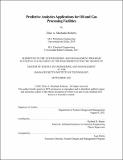| dc.contributor.advisor | Braatz, Richard D. | |
| dc.contributor.author | Machado Roberty, Elias A. | |
| dc.date.accessioned | 2022-02-07T15:23:03Z | |
| dc.date.available | 2022-02-07T15:23:03Z | |
| dc.date.issued | 2021-09 | |
| dc.date.submitted | 2021-10-21T19:56:02.587Z | |
| dc.identifier.uri | https://hdl.handle.net/1721.1/140083 | |
| dc.description.abstract | The oil and gas industry faces profitability and sustainability challenges that demand companies to have more efficient, reliable, safe, and environmentally friendly operations. Furthermore, as oil and gas companies embark on the Industry 4.0 journey, the pillar of big data becomes increasingly important in an industry that generates massive amounts of data with low to no value extracted from it. Data are generated across all value chain sectors—upstream, midstream, and downstream—starting at reservoirs up to the finished products delivered by the refining and petrochemical sectors. Processing facilities across the value chain, where physical and chemical unit operations convert raw products into intermediate and finished products, generate a wealth of data through their heavily instrumented automatic control systems, operational routines, and quality control systems. Analyzing process data can help companies develop models that predict key process-related parameters to correct potential process upsets timely. In addition, predictive models can also be incorporated into digital twins to emulate diverse operating scenarios for production optimization or facility design purposes. This thesis investigates and reviews the application of predictive analytics on process data, its potential untapped value, analytics as an enabler of digital twins, and big data analytics frameworks tailored for an oil and gas context. Use cases across all segments of the value chain are reviewed with their respective predictive methods. The value of predictive analytics in oil and gas is assessed by reviewing various sources, including a major oil company success case followed by the architectural integration of predictive analytics into the development of a digital twin employing a systems-oriented approach. The last chapter discusses the predictive component of a novel approach tailored for process data analytics: Smart Process Analytics. The advantages such a framework offers versus standard automated predictive model development processes are discussed. Lastly, big data architectures for SPA implementation at process plants are developed. | |
| dc.publisher | Massachusetts Institute of Technology | |
| dc.rights | In Copyright - Educational Use Permitted | |
| dc.rights | Copyright retained by author(s) | |
| dc.rights.uri | https://rightsstatements.org/page/InC-EDU/1.0/ | |
| dc.title | Predictive Analytics Applications for Oil and Gas Processing Facilities | |
| dc.type | Thesis | |
| dc.description.degree | S.M. | |
| dc.contributor.department | System Design and Management Program. | |
| dc.contributor.department | System Design and Management Program. | |
| dc.identifier.orcid | https://orcid.org/0000-0001-5638-315X | |
| mit.thesis.degree | Master | |
| thesis.degree.name | Master of Science in Engineering and Management | |
